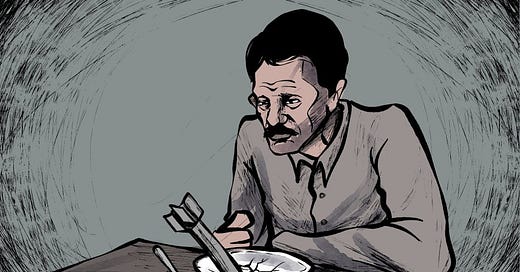Eurasia note #39 - What's Happening In Elsewhere
A series of cold wars spread frosty fingers, like parallel plots in a TV drama
Sanctions will massively amplify food shortages initiated by pandemic.
Russia gains importance as supplier of food, fertilizer and fuel.
The impact of sanctions reveals why outsiders seek regime change in Moscow.
Wars in Ukraine and Syria are linked in a powerplay to pipe gas to Europe.
Trade blocs realign as alliances flap, like tattered flags of convenience.
See also:
Eurasia note #77 - Ukraine: The War Everyone Saw Coming - The dispossession of human and mineral in the service of Monsanto-Bayer (May 05, 2023)
Beyond War: Containing The Fallout; We are all chattels in the globalists' war to gain control of the world's resources (Mar 24, 2022)
Eurasia Note #19 - Ukraine: Just Bizniz For Some - Claiming to defend a country, while looting it, has touch of depravity (Jan 27, 2022)
(1,400 words or about seven minutes’ read.)
Tbilisi, Apr 1, 2022
The first long-running TV hospital drama in the 1980s broke the mold with ensemble casts and overlapping narratives.
St Elsewhere used several story lines in parallel, just as news outlets revisit a scenario, with a fungible cast of characters coming and going to keep the audience transfixed in excitement, suspense and fear.
If the first cold war supposedly ended with the collapse of the Soviet Union, the second began in 2001 with the war on terror. The third was the coronavirus war.
The mass media insists Ukraine marks a new cold war. In reality none of them ever ended. They all exist at the same time, sometimes pulled into focus, other times shifted into the background, the transition disguised by fights and caterwauling.
It’s impossible to watch the Russia-Ukraine conflict without noticing parallel developments. It helps to look elsewhere.
Shifting trade blocs
The dysfunctional sanctions are another pretext for a Great Reset — as was the pandemic, as numerous politicians stated openly at its outset. If you insist that the Reset is imaginary, you must explain sanctions that do most harm to those who impose them.
There are in fact several resets, involving control of peoples, resources and the tectonic shift of trade blocs.
The sanctions will amplify shortages of food and fuel. Russia and Belarus produce 40 per cent of potash, vital for potassium fertilizer which is combined with nitrogen extracted from natural gas. While food prices rise, petrol or gas, and diesel are spiking in price, taking another bite out of people’s ability pay for food.
The irony, which we shall explore in the next article, is the sanctions regime has revealed how important the world’s biggest country is to the global food system.
The war in Ukraine is just another aspect of the chaos that Joe Biden promised last week would far exceed that of the previous century.
See Beyond War: Containing The Fallout; We are all chattels in the globalists' war to gain control of the world's resources (Mar 24, 2022)
Geopolitics is ultimately about security and money. It is not an abstract art form as the press and think tanks would have you believe. Great powers are controlled by great wealth and their aim is always to protect their assets and secure more.
Right now they are rushing to lock in suppliers and customers — there is no loyalty among thieves and the flags of longstanding alliances blow, tattered in the wind.
This means, however, that nation states with a dwindling resource base, which are less scientifically advanced, whether in Europe, Africa or Arabia, are in trouble. If I was an emir I would worry right now for the future of my culture and society because the elites may be more cut-throat than they seem.
War in Ukraine, like Syria, was always, in part, about pipelines.
Shoes and ships and sealing wax
Russia and Ukraine are directly connected to the Persian Gulf, via the war-not-war with Syria.
Since Western countries placed sanctions on Russia they have scrambled to find ways to replace its hydrocarbons. Moscow has not turned off the tap; it is fulfilling existing contracts but says future deals may be priced in roubles.
The U.S. cannot currently increase supplies to Europe and its promises to make up the shortfall remain hot air until more capacity is added. [1]
Qatar and Iran, who share the Persian fields, could sell their gas more competitively if they could lay pipelines across Syria and, via Turkey or the Mediterranean Sea, reach Europe.
Germany claims to have struck a long-term deal with Qatar on Mar 20 for LNG but tankers remain more expensive than pipeline gas. LNG tankers usually work in the spot market, sailing to whoever pays most. Vice Chancellor Robert Habeck says his country will end its dependence on Russian energy by the end of this year. Yet terminals for liquefied natural gas in Brunsbuttel and Wilhelmshaven in northern Germany could take from four years to build.
Israel is reported to have secretly signed a deal with Syria in Jan 2022 to pipe gas to Lebanon via an existing pipeline. [2]
In recent weeks, Iran normalized relations with Saudi Arabia, then Syria’s president Bashar al-Assad visited the United Arab Emirates. It’s more than a case of my enemy’s enemy is my friend.
Earlier this month the Saudi crown prince Mohammed bin Salman turned down a phone call from the president of the United States, as did UAE leader Sheikh Mohammed bin Zayed.
Keep reading with a 7-day free trial
Subscribe to Moneycircus to keep reading this post and get 7 days of free access to the full post archives.



